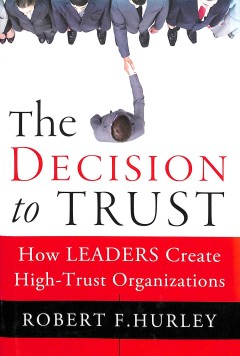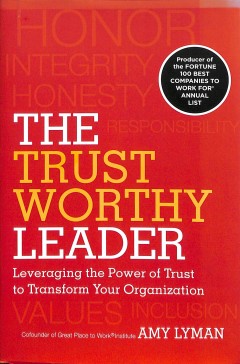Ditapis dengan

The decision to trust : how leaders create high-trust organization
A proven model to create high-performing, high-trust organizations Globally, there has been a decline in trust over the past few decades, and only a third of Americans believe they can trust the government, big business, and large institutions. In The Decision to Trust, Robert Hurley explains how this new culture of cynicism and distrust creates many problems, and why it is almost impossible to…
- Edisi
- -
- ISBN/ISSN
- 978-1-118-07264-6
- Deskripsi Fisik
- 245 p.; 24 cm.
- Judul Seri
- -
- No. Panggil
- LC 658.4036 HUR t

Port governance in the UK: Planning without policy
The UK's highly privatised port systemmeans that,while many of the issues in the port governance literature relevant to port concessions do not arise here, the respective roles of harbour authorities and port operators continue to be questioned. The concern in the UK is whose role it should be to monitor the capacity and service quality of the port sector, including how to govern the ways in wh…
- Edisi
- -
- ISBN/ISSN
- 2210-539
- Deskripsi Fisik
- 11 p.
- Judul Seri
- Research in Transportation Business & Management
- No. Panggil
- ATC PO IOS p

An examination of the nature of trust in logistics outsourcing relationship …
Using China’s burgeoning logistics industry as a backdrop, the present study focused on how to build trust between logistics users and third-party logistics (3PL) providers, and the antecedents and consequences of trust.
- Edisi
- Vol. 108 No. 3, 2008
- ISBN/ISSN
- -
- Deskripsi Fisik
- 25 p.
- Judul Seri
- Industrial Management & Data Systems
- No. Panggil
- ATC LO DAN a

What breaks trust in customer supplier relationship?
The purpose of this paper is to understand what breaks trust in a customer supplier relationship and how to repair it.
- Edisi
- Vol. 48 No. 3, 2010 pp. 353-365
- ISBN/ISSN
- 0025-1747
- Deskripsi Fisik
- 15 p.
- Judul Seri
- Management Decision
- No. Panggil
- ATC MG LAE w

The role of the Atlantic corridor project as a form of strategic community of…
This paper aims to summarise the scope, methodology and main findings of a doctoral thesis about business transformation in Latin America taken from a project management (PM) and communities of practice (CoP) perspective.
- Edisi
- Vol. 3 No. 2, 2010
- ISBN/ISSN
- -
- Deskripsi Fisik
- 13 p.
- Judul Seri
- International Journal of Managing Projects in Business
- No. Panggil
- ATC LO WAL t

Underneath organizational health and knowledge sharing
This research excursion through shipping companies in Vietnam seeks to examine if corporate social responsibility (CSR) influences trust, which in turn engenders the chain of effects from upward influence behavior through organizational health to knowledge sharing.
- Edisi
- Vol. 26 No. 1, 2013 pp. 139-168
- ISBN/ISSN
- 0953-4814
- Deskripsi Fisik
- 32 p.
- Judul Seri
- Journal of Organizational Change Management
- No. Panggil
- ATC MG TUA u

Trust development and horizontal collaboration in logistics: a theory based e…
The purpose of this article is to provide academicians and practitioners alike with a theory-based framework regarding horizontal collaboration in logistics. The proposed tool is based on an incremental perspective, according to two main dimensions: mutual trust among partners and the extent of the cooperation.
- Edisi
- Vol. 20 Issue: 1, pp.83-97
- ISBN/ISSN
- -
- Deskripsi Fisik
- 17 p.
- Judul Seri
- Supply Chain Management: An International Journal
- No. Panggil
- ATC LO POM t

Social exchange behavior in logistics relationships: a shipper perspective
- Edisi
- Vol. 29 Issue: 2, pp.103-121
- ISBN/ISSN
- -
- Deskripsi Fisik
- 22 p.
- Judul Seri
- International Journal of Physical Distribution & Logistics Management
- No. Panggil
- ATC LO MOO s
- Edisi
- Vol. 29 Issue: 2, pp.103-121
- ISBN/ISSN
- -
- Deskripsi Fisik
- 22 p.
- Judul Seri
- International Journal of Physical Distribution & Logistics Management
- No. Panggil
- ATC LO MOO s

Relationship marketing practice in Lithuanian logistics organizations
The purpose of this paper is to establish relationship marketing practice aspects, their prevalence and opportunities in Lithuanian logistics organizations.
- Edisi
- Vol. 6 Issue: 1, pp.71-88
- ISBN/ISSN
- -
- Deskripsi Fisik
- 20 p.
- Judul Seri
- Baltic Journal of Management
- No. Panggil
- ATC LO JUS r

Multicultural competence and trust: a new road for logistics management?
The present paper aims to discuss the concept of competence from a multicultural perspective, for organisational success. It argues that models that view competence as a sum of competencies for management development within organisations could benefit from a multicultural perspective that put those competencies within the context of cultural sensitivity and understanding, so as to promote a tru…
- Edisi
- Vol. 11 Issue: 3, pp.38-53
- ISBN/ISSN
- -
- Deskripsi Fisik
- 18 p.
- Judul Seri
- Cross Cultural Management: An International Journal
- No. Panggil
- ATC LO CAN m

Exploring the performance effects of key-supplier collaboration: an empirical…
To examine the conditions under which the proposed benefits of collaboration between a firm and its suppliers will occur.
- Edisi
- Vol. 35 No. 6, 2005 pp. 445-461
- ISBN/ISSN
- -
- Deskripsi Fisik
- 23 p.
- Judul Seri
- International Journal of Physical Distribution & Logistics Management
- No. Panggil
- ATC LO FEL e

Does morality explain opportunism in marketing channel negotiations?: The mod…
Retailers are increasingly forced to enter negotiations with new suppliers and have less time to develop trusting relationships prior to awarding sourcing contract. Such supplier negotiations are often guided by self-interest-seeking behavior. However, not all exchange partners behave opportunistically when given the opportunity and little is known about how and when opportunism actually occurs…
- Edisi
- Vol. 37 No. 2, 2009 pp. 142-160
- ISBN/ISSN
- -
- Deskripsi Fisik
- 21 p .
- Judul Seri
- International Journal of Retail & Distribution Management
- No. Panggil
- ATC LO KHA d

Do microblog postings influence consumer perceptions of retailers' e-services…
Consumers are increasingly connected to each other through electronic devices. Consequently, the potential for online retailer (hereafter, e-tailer) initiated communications delivered through electronic media to inspire viral-like e-WOM processes among consumers is also expanding. Microblog postings and e-mails may impact consumers’ perceptions of retail web sites (e-servicescape). These perc…
- Edisi
- Vol. 35 No. 9, 2012 pp. 818-836
- ISBN/ISSN
- -
- Deskripsi Fisik
- 22 p.
- Judul Seri
- Management Research Review
- No. Panggil
- ATC LO TAY d

Balancing IJV knowledge contributions and trust needs
This paper aims to present a model that explains how knowledge contributions of international joint venture (“IJV”) partners can be balanced or imbalanced, which affects each partners’ trust needs, with implications for future partner relationships.
- Edisi
- Vol. 23 No. 3, 2015 pp. 200-223
- ISBN/ISSN
- -
- Deskripsi Fisik
- 25 p.
- Judul Seri
- The Multinational Business Review
- No. Panggil
- ATC LO HAR b

An exploration of trust and shared values in UK defence supply networks
This paper aims to develop a “line of sight” between improved military capability through supply network effectiveness to trust and shared values, and test the proposition that the effectiveness of the UK’s military supply network (SN) will reflect the extent of the shared values within that network.
- Edisi
- Vol. 43 No. 2, 2013 pp. 148-166
- ISBN/ISSN
- -
- Deskripsi Fisik
- 21 p .
- Judul Seri
- International Journal of Physical Distribution & Logistics Management
- No. Panggil
- ATC LO TAT a

Relationship marketing practice in Lithuanian logistics organizations
The purpose of this paper is to establish relationship marketing practice aspects, their prevalence and opportunities in Lithuanian logistics organizations.
- Edisi
- Vol. 6 No. 1, 2011 pp. 71-88
- ISBN/ISSN
- -
- Deskripsi Fisik
- 20 p.
- Judul Seri
- Baltic Journal of Management
- No. Panggil
- ATC LO GRI r

Suppliers' affective trust and trust in competency in buyers: Its effect on c…
The purpose of this paper is to measure trust that logistics/supply chain management (SCM) managers of supplier firms perceive toward inbound SCM managers of buyer firms, and investigate the effect of trust on supply chain collaboration and logistics efficiency. In doing so, two trust forms are introduced: affective trust and trust in competency. Besides, supply chain collaboration includes the…
- Edisi
- Vol. 31 No. 1, 2011
- ISBN/ISSN
- -
- Deskripsi Fisik
- 26 p.
- Judul Seri
- International Journal of Operations & Production Management
- No. Panggil
- ATC LO CHO s

The evolving role of supply chain managers in global channels of distribution…
Supply chains have become a strategic strength to many firms due to the nature of the globalization of business. The past roles of supply chain managers have changed dramatically and now also include various new duties that will enhance firm competitiveness due to their boundary spanning nature and the new focus of learning organizations. The paper aims to discuss these issues. Design/methodolo…
- Edisi
- Vol. 44 No. 8/9, 2014
- ISBN/ISSN
- -
- Deskripsi Fisik
- 21 p .
- Judul Seri
- International Journal of Physical Distribution & Logistics Management
- No. Panggil
- ATC LO LEV t

The trust worthy leader : leveraging the power of trust to transform your org…
The Trustworthy Leader reveals the benefits organizations enjoy when trustworthy behavior is practiced consistently by their leaders. Drawing from examples from the Best Companies to Work For, Lyman, cofounder of Great Place to Work Institute, explains that being trustworthy means that leaders' behaviors are rooted in their commitment to the value of trust and not simply in an imitation of the…
- Edisi
- -
- ISBN/ISSN
- 978-0-470-59628-9
- Deskripsi Fisik
- xiii, 209 p., ; illus : 23,5 cm ; index
- Judul Seri
- -
- No. Panggil
- LC 303.34 LYM t
 Karya Umum
Karya Umum  Filsafat
Filsafat  Agama
Agama  Ilmu-ilmu Sosial
Ilmu-ilmu Sosial  Bahasa
Bahasa  Ilmu-ilmu Murni
Ilmu-ilmu Murni  Ilmu-ilmu Terapan
Ilmu-ilmu Terapan  Kesenian, Hiburan, dan Olahraga
Kesenian, Hiburan, dan Olahraga  Kesusastraan
Kesusastraan  Geografi dan Sejarah
Geografi dan Sejarah